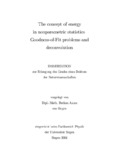Citation link:
https://nbn-resolving.org/urn:nbn:de:hbz:467-727| Dokument Type: | Doctoral Thesis | metadata.dc.title: | The concept of energy in nonparametric statistics: Goodness-of-Fit problems and deconvolution | Authors: | Aslan, Berkan | Institute: | Fachbereich 7, Physik | Free keywords: | Goodness-of-Fit, two-sample problem, deconvolution | Dewey Decimal Classification: | 530 Physik | GHBS-Clases: | UDXM | Issue Date: | 2004 | Publish Date: | 2005 | Abstract: | In this thesis the concept of energy is introduced from physics into statistics. The energy of samples, which are drawn from statistical distributions, is defined in a similar way as for discrete charge density distributions in electrostatics. A system of two sets of point charges with opposite sign is in a state of minimum energy if they are equally distributed. This property is used to construct new nonparametric, multivariate Goodness-of-Fit tests, to check whether two samples belong to the same parent distribution and to deconvolute distributions distorted by measurement. The statistical minimum energy configuration does not depend on the application of the one-over-distance power law of the electrostatic potential. To increase the power of the new approach other monotonic decreasing distance functions may be chosen. We prove that the new energy technique is applicable to all distance functions which have positive Fourier transforms. The proposed approach is binning-free. It is especially powerfull in multidimensional applications and superior to most of the common statistical methods in many concrete situations. In dieser Arbeit wird das Energiekonzept aus der Physik in die Statistik übertragen. Die Energie von Stichproben, die aus statistischen Verteilungen gezogen werden, wird in ähnlicher Weise definiert wie für elektrostatische Punktladungen. Ein System von zwei Punktladungsmengen mit entgegengesetztem Vorzeichen befindet sich im Zustand minimaler Energie, wenn sie der gleichen Verteilung folgen. Dieses Konzept wird zur Konstruktion von neuen nichtparametrischen, mehrdimensionalen Anpassungstests verwendet. Weiterhin wurde das Energieverfahren auf das Zwei-Stichproben Problem und die Entfaltung angewandt. Das statistische Minimum Konzept der Energie hängt nicht von der Abstandsfunktion des elektrostatischen Potentials ab. Um die Güte der entwickelten Methoden zu erhöhen, können andere monoton fallende Abstandsfunktionen gewählt werden. Wir zeigen, dass das Verfahren für alle Abstandsfunktionen anwendbar ist, die eine positive Fouriertransformierte haben. Die vorgeschlagene Methode benötigt keine Intervallbildung. Sie hat ihre Stärken bei mehrdimensionalen Problemstellungen und ist hier herkömmlichen Verfahren in vielen konkreten Anwendungen überlegen. |
URN: | urn:nbn:de:hbz:467-727 | URI: | https://dspace.ub.uni-siegen.de/handle/ubsi/72 | License: | https://dspace.ub.uni-siegen.de/static/license.txt |
| Appears in Collections: | Hochschulschriften |
This item is protected by original copyright |
Page view(s)
509
checked on Dec 27, 2024
Download(s)
153
checked on Dec 27, 2024
Google ScholarTM
Check
Items in DSpace are protected by copyright, with all rights reserved, unless otherwise indicated.


